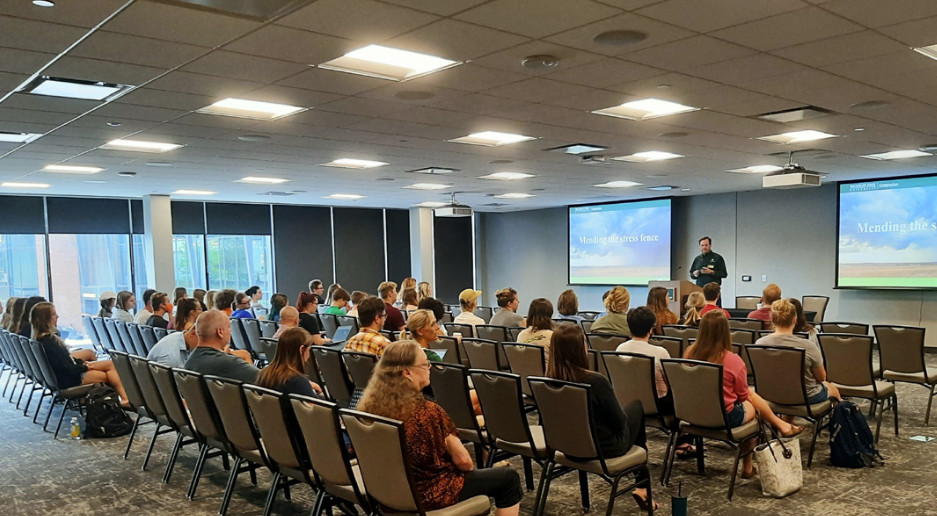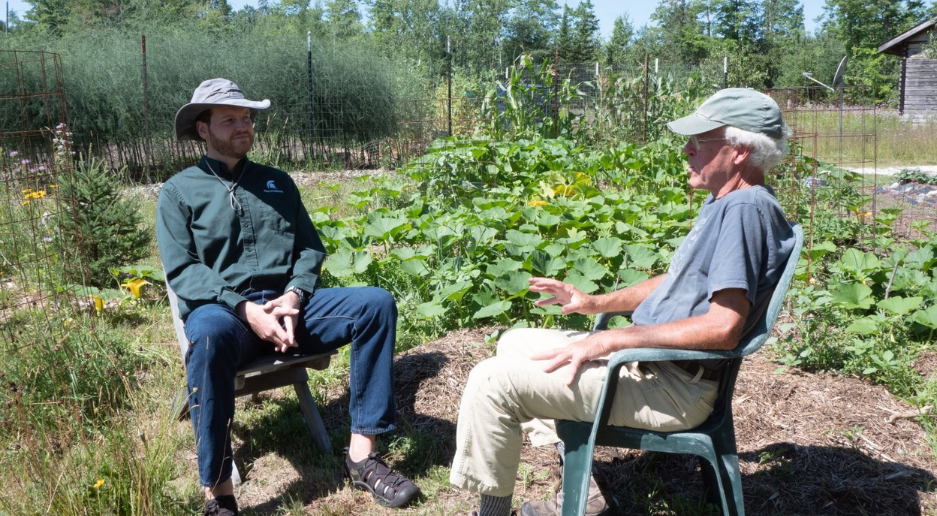MSU Extension farm stress program receives donation from Cherry Republic, Inc.
Cherry Republic, Inc. donated a portion of all sales during the month of February to the MSU Extension Managing Farm Stress program to support mental health and wellbeing of Michigan farmers.

Remi Rice, Ph.D., sometimes jokes that he must have been created in a lab for his job. A fifth-generation farmer, Rice grew up on a family farm in Northern Michigan. His dad ran the farm and his mom worked as a therapist.
His passion for farming is deeply rooted in his family history, but the lessons he learned on the farm are what motivated him to pursue a career in health psychology. Rice now leads the Michigan State University Extension Managing Farm Stress program, and he is on a mission to ensure no farmer deals with mental health challenges alone.
Comprising a team of more than 20 dedicated professionals, MSU Extension’s farm stress programs connect Michigan farmers to services and resources addressing the specific difficulties they may face as a result of their profession. The program offers a broad spectrum of supportive resources, including access to free teletherapy services, financial and business management education, community workshops and programs available in other languages specifically serving the needs of the migrant farmworker community.
The farm stress program recently received a generous donation from one of Michigan’s most beloved brands. As part of an ongoing effort to support the state’s agriculture community, Cherry Republic, Inc., donated a portion of all sales during the month of February to MSU Extension’s farm stress efforts, totaling a contribution of $18,000. “Cherry Republic’s gift is already making a direct impact on the communities we serve,” said Rice.
Combating farm stress, curating resources for the farming community

Experiencing stress is a universal part of the human experience, regardless of one’s profession. But there are occupations that can be more challenging than others, including farming.
Farm stress is defined as the stress experienced by farmers and their families because of the unique agricultural work environment. Part of what makes this stress unique is that so many of the challenges they face fall beyond their individual control.
“As a farmer, you don’t get to decide what the weather is going to look like or how prices or regulations are going to change,” said Rice.
Farm work is also physically taxing and can be dangerous, which contributes to additional stress. Unlike other professions, farmers typically don’t have the luxury of separating their work life from their home life. In many other occupations, when you leave the office, your work stays there.
“Thinking about my dad, for example, he can see his cattle right through the window,” said Rice. “We know that the greater separation you have between your work and your personal life, the better health outcomes, so this is a significant challenge for our farmers.”
The multitude of challenges confronting agricultural professionals can feel endless, and that leads to real-world consequences. Farmers have one of the highest rates of deaths by suicide of any profession, in addition to disproportionate rates of anxiety, job-related fatigue and other mental health challenges.
Recognizing the need to support the mental health needs of farming communities, the Michigan Department of Agriculture (MDARD) approached MSU Extension in 2016 about developing a program tailoring support services to agricultural professionals. This marked the beginning of an important partnership with MDARD and over 20 MSU Extension staff members.
MSU Extension’s team is made up of experts in different domains, such as behavioral health specialists like Rice, but also business and financial management educators. By creating and implementing programs for farmers and those who work with farmers, this diverse team was able to start providing an extensive and comprehensive range of services to farmers and agricultural professionals statewide.
Additional grants from MDARD, as well as U.S. Department of Agriculture (USDA) funding provided by the Farm Ranch Stress Assistance Network (FRSAN) created in the 2018 Farm Bill, has allowed the MSU Farm Stress program to further enhance their operations.
“From the beginning, prevention is a big component of what we do. We are not reinventing the wheel, but making that wheel look more like a tractor tire by packaging behavioral health resources in a way that is adapted specifically to meet the needs of our farming communities.” - Remi Rice, Ph.D.

‘You saved my farm, and likely my life’
Currently, the farm stress program is operating on a one-time MDARD grant that is set to expire at the end of August 2024. As Congress debates the components of the next Farm Bill, USDA funding supporting the FRSAN is set to expire at the end of September 30. While optimistic about the prospect of additional support through the new Farm Bill and from their partners at MDARD, Rice said that uncertainty about future funding has already started to impact their current operations.
“We never want to be in a position where we have to turn away anyone seeking our services,” said Rice. “But some client providers are winding down recruitment efforts into our teletherapy program because of the possibility of a gap in our grants.”
While awaiting future grant funding decisions, Rice said the support received from Cherry Republic has played a crucial role in maintaining many of the programs and services his team can provide.
“We are so profoundly grateful for Cherry Republic’s support. This gift will allow us to continue offering free counseling services to farmers, farm families and other agricultural professionals across Michigan,” said Rice. “It will also allow us to continue offering critical workshops on identifying warning signs of suicide, which have real-life implications.”
An example of one of those real-life implications is a farmer who was connected to the farm stress program by a veterinarian who had taken one of MSU Extension’s workshops. The veterinarian noticed that this farmer, who he regularly worked with, was exhibiting some troubling warning signs after a tuberculosis outbreak on his cattle farm.
“Because of our training program, the veterinarian knew what to do and we were able to connect the farmer with our free counseling services,” said Rice. “Later, that same farmer reached out to us and shared that this program saved his farm and likely saved his life.”

Funding for the future
MSU Extension’s farm stress program is in the process of setting up an endowment, which Rice said will help supplement long-term funding needs.
“We realize grants have deadlines,” he said. “What happens if we have ten farmers that are in therapy and the grant ends? How are we going to support them? So, the endowment is a future-focused idea to help fill in those gaps between grants, or if a grant ends.”
While private funding would not replace the need for continued grant partnerships with MDARD, USDA and other agencies, Rice said endowment support would ideally provide a base of funding. Ultimately, this would enable MSU Extension to continually support vital services like teletherapy and other mental health awareness and support programs.
Additionally, private gifts, like the recent donation from Cherry Republic, also help the program build trust in the community. “You're not going to reach out for help to someone that you don't trust,” said Rice. “Cherry Republic giving this gift now is signaling to everyone who trusts Cherry Republic that they see us as a trusted ally, which goes a long way in normalizing the help seeking behavior MSU is promoting. That is so important.”
As we recognize Mental Health Awareness Month — a national initiative each May focused on raising awareness for causes promoting mental health treatment, resources and education — Rice wants Michigan farmers to know that they are not alone. As he and his team look to the future, he said they are committed to doing all they can to serve the dedicated agricultural professionals who make up the backbones of our communities.
“I was a farm kid growing up, so this is very personal to me,” he said. “No farms, no food. We are all connected to agriculture. It is a pillar of our society, and we are reliant on these individuals. Everyone struggles at times and that's normal. Asking for help is normal too.”
Visit the MSU Extension Managing Farm Stress program website to learn more about services and resources available. You can contribute to the MSU Extension Farm Stress Program Endowment here.



 Print
Print Email
Email




